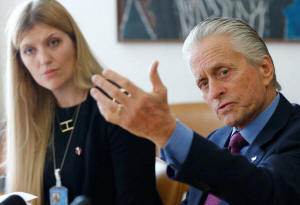|
Anti-nuclear campaign group wins 2017
Nobel Peace Prize
 Send a link to a friend
Send a link to a friend
 [October 06, 2017]
By Nerijus Adomaitis and Tom Miles [October 06, 2017]
By Nerijus Adomaitis and Tom Miles
OSLO/GENEVA (Reuters) - The Norwegian Nobel
Committee, warning of a rising risk of nuclear war and the spread of
weapons to North Korea, awarded the 2017 Nobel Peace Prize on Friday to
a little-known campaign group seeking a global ban on nuclear arms.
The award for the International Campaign to Abolish Nuclear Weapons
(ICAN) was unexpected, particularly in a year when the architects of the
2015 nuclear deal between international powers and Iran had been seen as
favorites for achieving the sort of diplomatic breakthrough that has won
the prize in the past.
ICAN describes itself as a coalition of grassroots non-government groups
in more than 100 nations. It began in Australia and was officially
launched in Vienna in 2007.
"We live in a world where the risk of nuclear weapons being used is
greater than it has been for a long time," said Berit Reiss-Andersen,
the leader of the Norwegian Nobel Committee.
"Some states are modernizing their nuclear arsenals, and there is a real
danger that more countries will try to procure nuclear weapons, as
exemplified by North Korea."

ICAN's executive director told Reuters the group was elated. Asked if
she had a message for North Korea's Kim Jong-Un, who has tested nuclear
arms in defiance of global pressure, and President Donald Trump, who has
threatened to "totally destroy" North Korea to protect the United States
and its allies, Beatrice Fihn said both leaders need to know that the
weapons are illegal.
"Nuclear weapons are illegal. Threatening to use nuclear weapons is
illegal. Having nuclear weapons, possessing nuclear weapons, developing
nuclear weapons, is illegal, and they need to stop."
NUCLEAR TENSIONS
The Nobel prize seeks to bolster the case of disarmament amid nuclear
tensions between Washington and Pyongyang, as well as uncertainty over
the fate of the 2015 deal between Iran and major powers to limit
Tehran's nuclear program.
The committee raised eyebrows with its decision to award the prize to an
international campaign group with a relatively low profile, rather than
recognizing the Iran deal, a complex agreement hammered out over years
of high-stakes diplomacy.
"Norwegian Nobel Committee has its own ways, but the nuclear agreement
with Iran achieved something real and would have deserved a prize,"
tweeted Carl Bildt, a former Swedish prime minister who has held top
posts as an international diplomat.
The Iran accord, which Trump has repeatedly called "the worst deal ever
negotiated," is seen as under particular threat this week. A senior
administration official said on Thursday Trump is expected to decertify
Iran's compliance, a step toward potentially unwinding the pact.
[to top of second column] |

Beatrice Fihn, Executive Director of the International Campaign to
Abolish Nuclear Weapons (ICAN) and U.S. actor and U.N. Messenger for
Peace Michael Douglas attend a news conference on nuclear
disarmament a the United Nations European headquarters in Geneva,
Switzerland May 12, 2016. REUTERS/Denis Balibouse/File Photo

The committee may have been reluctant to reward the Iranian
government for its role in the nuclear deal because the only Iranian
winner so far, 2003 laureate Shrin Ebadi, a lawyer and human rights
campaigner, is forced to live in exile.
"I think the committee has thought about the human rights situation
in Iran. It would have been difficult to explain the prize even
though it has a favorable view of the Iran deal," Asle Sveen, a
historian of the Nobel Peace Prize, told Reuters.
The Norwegian Nobel committee denied that giving the prize to an
anti-nuclear group was intended either as rebuke to Trump or as a
snub to the architects of the Iran nuclear deal.
"The Iran treaty is a positive development, a disarmament
development that is positive, but the reason we mentioned North
Korea (in our statement) is a reference to the threat that people
actually feel," Reiss-Andersen told Reuters.
"Iran has not voiced recent threats to use nuclear weapons, on the
contrary," she said in an interview.
ICAN has campaigned for a a U.N. Treaty on the Prohibition of
Nuclear Weapons, which was adopted by 122 nations in July this year.
The agreement does not include -- and would not apply to -- any of
the states that already have nuclear arms, which include the five
U.N. Security Council permanent members, the United States, Russia,
China, Britain and France, as well as India, Pakistan and North
Korea. Israel is also widely assumed to have nuclear weapons,
although it neither confirms nor denies it.
Major allies of the declared nuclear powers also oppose the new
treaty. The United Nations said the award would help bolster efforts
to get the 55 ratifications by countries for the new U.N. treaty to
come into force.

"I hope this prize will be conducive for the entry into force of
this treaty," U.N. Chief Spokeswoman Alessandra Vellucci told a news
briefing.
(Additional reporting by Joachim Dagenborg, Terje Solsvik, Henrik
Stolen, Gwladys Fouche and Alister Doyle in Oslo, Stephanie Nebehay
in Geneva, writing by Gwladys Fouche and Alister Doyle, editing by
Peter Graff)
[© 2017 Thomson Reuters. All rights
reserved.]
Copyright 2017 Reuters. All rights reserved. This material may not be published,
broadcast, rewritten or redistributed. |